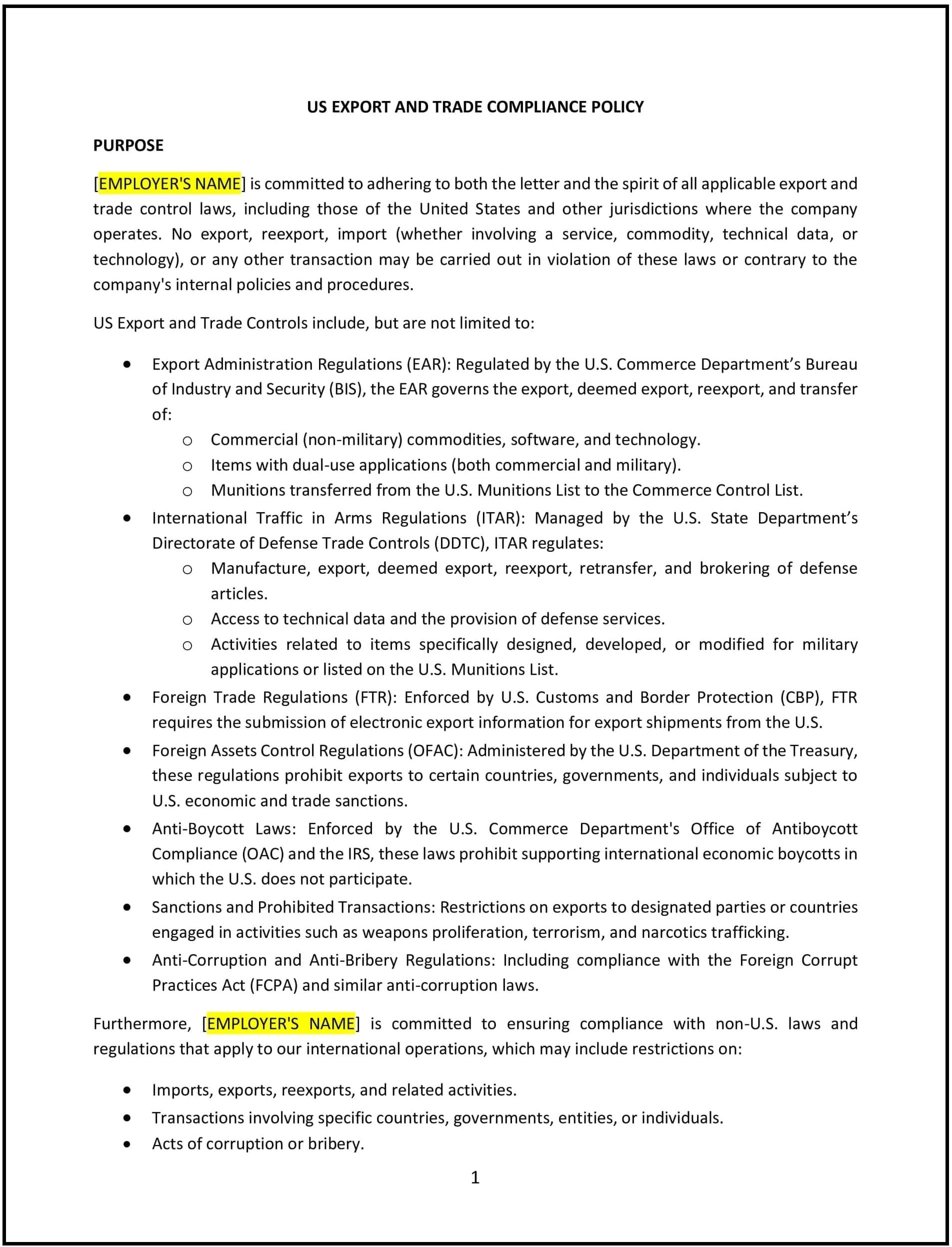US export and trade compliance policy (New Hampshire): Free template
Got contracts to review? While you're here for policies, let Cobrief make contract review effortless—start your free review now.

Customize this template for free
US export and trade compliance policy (New Hampshire)
A US export and trade compliance policy helps New Hampshire businesses navigate the complex legal requirements related to international trade, including the export of goods, services, and technology. This policy provides guidelines for ensuring that businesses comply with federal regulations governing export controls, sanctions, and embargoes. It defines the steps employees should follow when engaging in international transactions and the responsibilities of the company in managing export compliance.
By implementing this policy, businesses can mitigate the risk of violations, maintain legal compliance, and build a strong reputation for ethical international business practices.
How to use this US export and trade compliance policy (New Hampshire)
- Define export controls: Clarify the types of products, services, and technology that are subject to export controls and the relevant regulations governing these items, such as the Export Administration Regulations (EAR) and International Traffic in Arms Regulations (ITAR).
- Identify compliance requirements: Outline the key compliance requirements for exporting goods or services, including restrictions on the export of sensitive items to certain countries, entities, or individuals.
- Establish due diligence procedures: Define the steps employees should take to conduct due diligence when engaging in international transactions, including verifying the identity of foreign customers, screening against government lists, and assessing the destination country’s legal requirements.
- Address sanctions and embargoes: Specify how employees should comply with US sanctions and embargoes, including restrictions on doing business with certain countries or parties as specified by the Office of Foreign Assets Control (OFAC).
- Set reporting protocols: Define how employees should report potential violations or concerns related to export controls or trade compliance, including any internal channels for reporting and escalation.
- Develop internal controls: Establish internal controls to ensure that export activities are monitored, documented, and compliant with regulations. This may include implementing software tools for tracking exports, audits, and regular reviews.
- Provide employee training: Outline the training requirements for employees involved in international transactions to ensure they understand their responsibilities under export laws.
- Address penalties for violations: Specify the penalties or consequences for non-compliance with export and trade regulations, including legal action, fines, and reputational damage.
- Review and update: Regularly review and update the policy to ensure it remains in line with evolving US export regulations, international trade agreements, and business needs.
Benefits of using this US export and trade compliance policy (New Hampshire)
This policy provides several benefits for New Hampshire businesses:
- Mitigates legal and financial risk: By adhering to export control laws and regulations, businesses reduce the risk of legal penalties, fines, and damage to their reputation.
- Ensures ethical business practices: The policy promotes ethical conduct in international trade, ensuring that businesses are not inadvertently supporting illegal activities or violating sanctions.
- Increases operational efficiency: Clear guidelines for international transactions help streamline compliance processes, making it easier for employees to follow regulations and complete necessary checks.
- Enhances global business relationships: Companies that comply with export laws demonstrate credibility and responsibility in the international marketplace, enhancing trust with customers, partners, and regulatory bodies.
- Protects intellectual property: Export control compliance helps safeguard sensitive company information, technology, and intellectual property from being accessed or misused by unauthorized entities.
Tips for using this US export and trade compliance policy (New Hampshire)
- Communicate the policy clearly: Ensure that all employees, particularly those involved in international sales, marketing, and logistics, are aware of the export and trade compliance policy and understand its importance.
- Conduct regular training: Provide ongoing training on export controls and trade regulations to employees who deal with international transactions, ensuring they are up to date on the latest laws and procedures.
- Implement internal monitoring systems: Use internal systems to monitor exports, track compliance, and provide documentation for audits. Regular audits should be conducted to identify any compliance gaps.
- Stay informed on legal updates: Regularly review changes in US export regulations, sanctions, and embargoes to ensure the business remains compliant with new legal requirements.
- Foster a compliance culture: Encourage a culture of compliance within the organization by ensuring that employees understand the importance of adhering to export laws and the potential consequences of non-compliance.